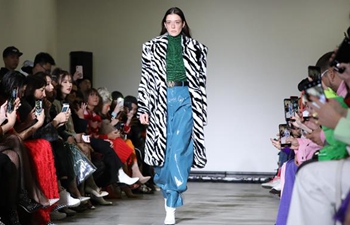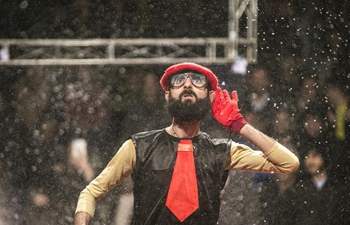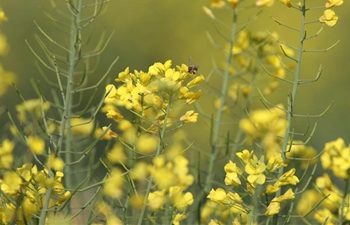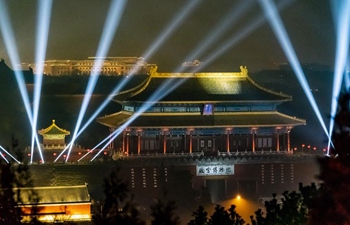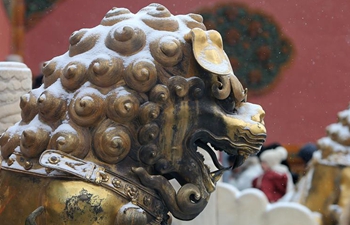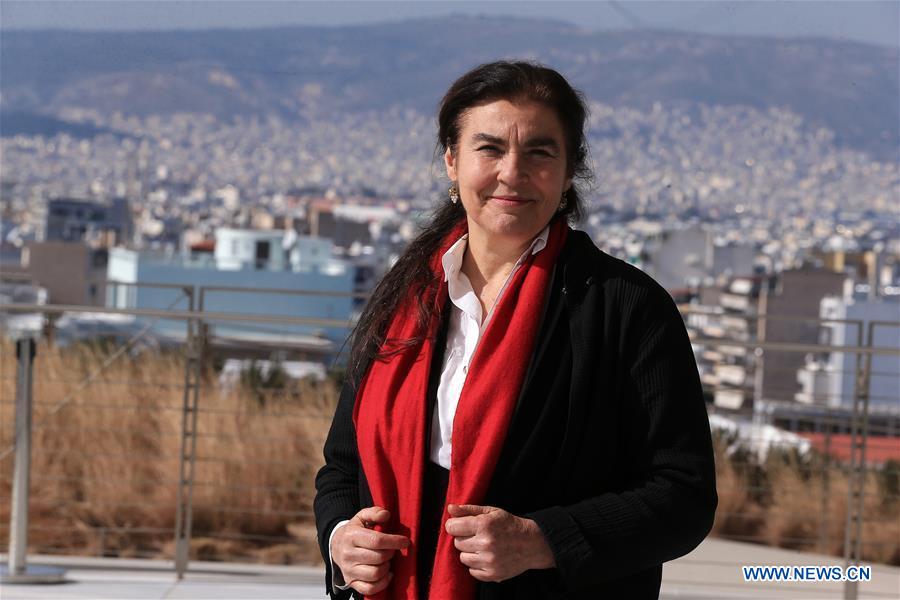
Lydia Koniordou, president of the Stavros Niarchos Foundation Cultural Center, poses for a photo at the Stavros Niarchos Foundation Cultural Center in Athens, Greece, on Feb. 19, 2019. Cultural exchanges help bridge differences, bring people together, and go beyond conflict and antagonism, Lydia Koniordou told Xinhua in a recent exclusive interview. (Xinhua/Marios Lolos)
by Alexia Vlachou, Yu Shuaishuai
ATHENS, Feb. 20 (Xinhua) -- Cultural exchanges help bridge differences, bring people together, and go beyond conflict and antagonism, Lydia Koniordou, president of the Stavros Niarchos Foundation Cultural Center, told Xinhua in a recent exclusive interview.
Koniordou, an acclaimed actress and director specializing in ancient Greek drama who had served as her country's minister of culture until last August, has undertaken a new role at the cultural center in Athens.
In her new post, she expects to bolster Sino-Greek ties and boost cultural collaboration between the two countries through dialogue.
Welcoming Xinhua correspondents at her office on Tuesday, Koniordou showed them around the cultural center's impressive buildings and the surrounding 200,000-square-meter park on the Faliro Bay shoreline.
Fully funded by the homonymous foundation, the Stavros Niarchos Foundation Cultural Center (SNFCC) was designed by the renowned Italian architect Renzo Piano and houses the National Opera and the National Library. This modern multi-use complex serves cultural, educational and entertainment purposes.
The center was handed over to the Greek state in 2017 and Koniordou has been its president since September last year.
"Now our idea is to have an extrovert policy beyond this local part of Athens, to expand in other parts of Greece and abroad," she said.
The SNFCC has already hosted a series of Chinese cultural activities and presentations, such as the celebration of the Spring Festival. The center is open to all and welcomes interactions, Koniordou pointed out.
For Koniordou, China has been "a source of inspiration" since her student times. She was curious to explore that part of the world and every time she visited China she collected little "Chinese treasures."
One of them is a bird-kite, which she bought in Beijing in 2004. For her, it is a symbol of freedom: one can fly in the sky and get close to the stars.
During her term at the Ministry of Culture, Koniordou enhanced bilateral Sino-Greek relations in several fields, especially during the Year of Greece-China Cultural Exchanges in 2017.
"These days, a Greek director is directing in the Chinese National Theatre 'Agamemnon', an ancient Greek drama featuring two Greek and numerous Chinese actors. Last year, the Greek National Theatre presented an adaptation of the traditional Chinese play 'Orphan of Zhao' with two Chinese actors in Athens," she said.
"There is so much to exchange: films, music and art. We haven't completed everything yet," she added.
Regarding the Belt and Road Initiative, Koniordou affirmed that Greece is an important country not only because of its ports and as a doorway to Europe, but also because of its culture and the values it shares with China.
She recalled that when she visited the historic city of Dunhuang in China's northwestern Gansu Province to participate in the 2nd Silk Road International Cultural Expo, she had a chance to visit and admire the nearby Mogao Caves, a system of several hundred temples located at a religious and cultural crossroads on the Silk Road.
"Getting to know your neighbor or getting to know somebody who happens to be very far away but has very common things can complete your own vision of the world," she stressed.
Regarding the collaboration between Greece and China, the president of the SNFCC said that breaking barriers and initiating dialogue are steps towards creating even stronger bonds and relationships.
"It is one thing to know each other's traditions. Another thing is to do things together. And I know great musicians -- both Chinese and Greek -- who meet and play together, creating great musical dialogues. Music can do this. Dance can do this. Theatre can do this," she told Xinhua.

